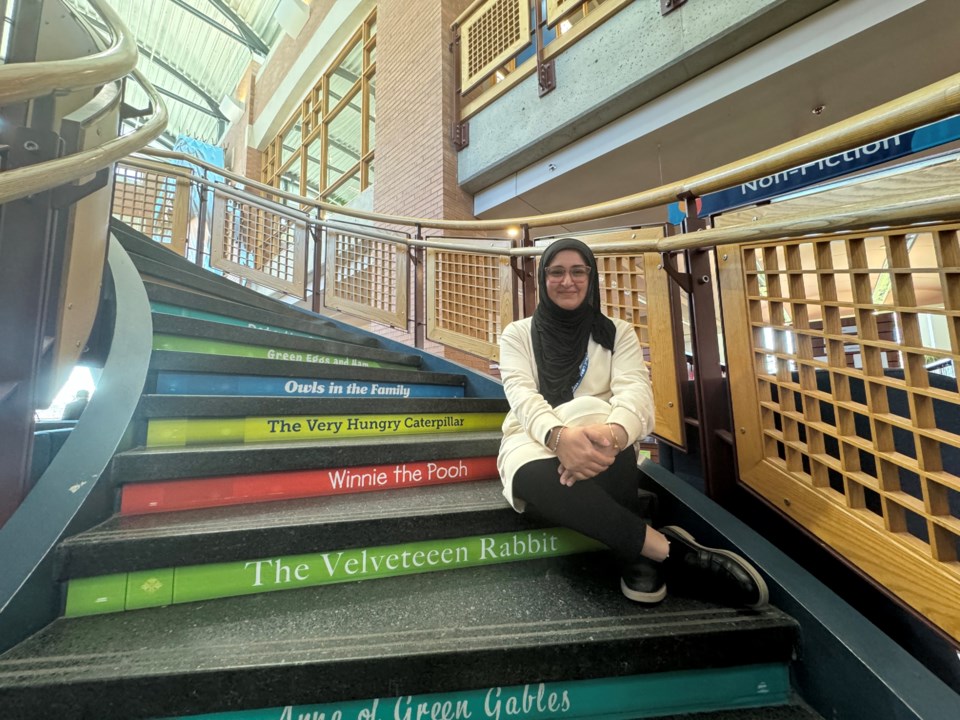It’s only been a couple of days since Ayesha Karim-Mian started her new role as the community navigator at the Barrie Public Library, but she says she’s already seeing the impact.
“People are very excited. I have already received a couple of requests for appointments to assist people with their Ontario Works application as well as for mental health supports,” she told BarrieToday.
Karim-Mian, who described the new role as being a “dream job” that felt like it was tailor-made for her, will work with individuals who visit the library and are experiencing societal issues, such as homelessness, precarious housing, food insecurity, poverty, unemployment, mental health crises and addictions at all three library locations, with a focus being on the downtown library.
“I believe it is a very important position because the library space is a very low-barrier community space where people come, access free internet, computers and have access to washroom facilities. It’s important to fill those gaps of services that may be lacking," she said.
Although Karim-Mian will be on site five to six days a week, she can’t be there 24-7, so will be working with library staff on how they can best provide help when she’s not there.
“The library staff are trained to run the library operations. When they have a patron who is in crisis, they’re not trained to help that person, which then takes them away from their real job, and then that affects the other patrons of the library," she said. "This role will take some stress away from them and will also assist the clients who are in crisis and need help.
“Working with the homeless is a very complex area. When they’re homeless, they’re not just homeless. There are other underlying issues that are affecting them … so sometimes getting into the first point of access needs time and rapport which cannot be achieved in a couple of meetings," Karim-Mian added. "That continuity is very important.”
In addition to being a social worker with CFS Counselling + Wellbeing (CFS), Karim-Mian has experience working at the Salvation Army and Catholic Family Services, and is also a certified language interpreter — she speaks Urdu, Hindi and Punjabi.
“We had a gentleman here who could barely speak English, but he spoke Punjabi, so I was able to communicate with him … and we were able to get him a library card,” she said.
The library is a welcoming space for everyone, says chief executive officer Lauren Jessop, but that can serve as both a benefit and a challenge.
“We are just trying to make sure that the patrons who are coming in here who are experiencing those challenging situations in their lives have the support they need,” she said, adding the new role also provides much-needed support for library staff.
“Our staff are skilled at information referral, readers advisory and helping people doing programs … but what we are not skilled at is helping someone who is facing multiple challenges in their lives and … navigating that system. It’s complex," Jessop added.
Funding for the new position comes from the County of Simcoe, she noted, adding it's part of a pilot project that is set to run until the end of the year.
“Throughout the summer, we will have to evaluate the outcomes of how it’s going and work with the county to see what we can do next," Jessop said.
From a system-service planning perspective, libraries have been used for decades as a daytime programming space for those experiencing homelessness or those who are unhoused, said Mina Fayez-Bahget, the county's general manager of social community services.
“We know that any critical space where someone experiences homelessness is engaging … we want to be part of that system," he said. "This was a great opportunity where the library had clearly asked for a resource and went to (Barrie city) council. We happened to also be there presenting our budget and it just made all sense in the world."
The county has a community safety investment fund for this exact type of program, Fayez-Bahget noted.
“It goes beyond the mandate of being a service manager and is funded directly from the county for things that are not covered by federal or provincial funding dollars,” he said. “Because this has a social service aspect to it we saw it as an opportunity to connect our systems and broaden our system. This is now a key access point for us where people experiencing homelessness … can come into the library (and) engage with the navigator … but we also capture that data point.”
A critical component of the funding, Fayez-Bahget explained, is the community navigator will now enter data of that person’s needs and interactions into the county’s homelessness database, which then allows staff to start building a “holistic profile” of the client.
“We know what their daytime needs are, their overnight and food security needs are … you start getting the different parts of the story from food banks, libraries, drop in centres," he added.
The county has also funded other pilot projects in Orillia, Innisfil and Collingwood, said Fayez-Bahget, adding the goal is to roll it out into a standing program for all libraries.





